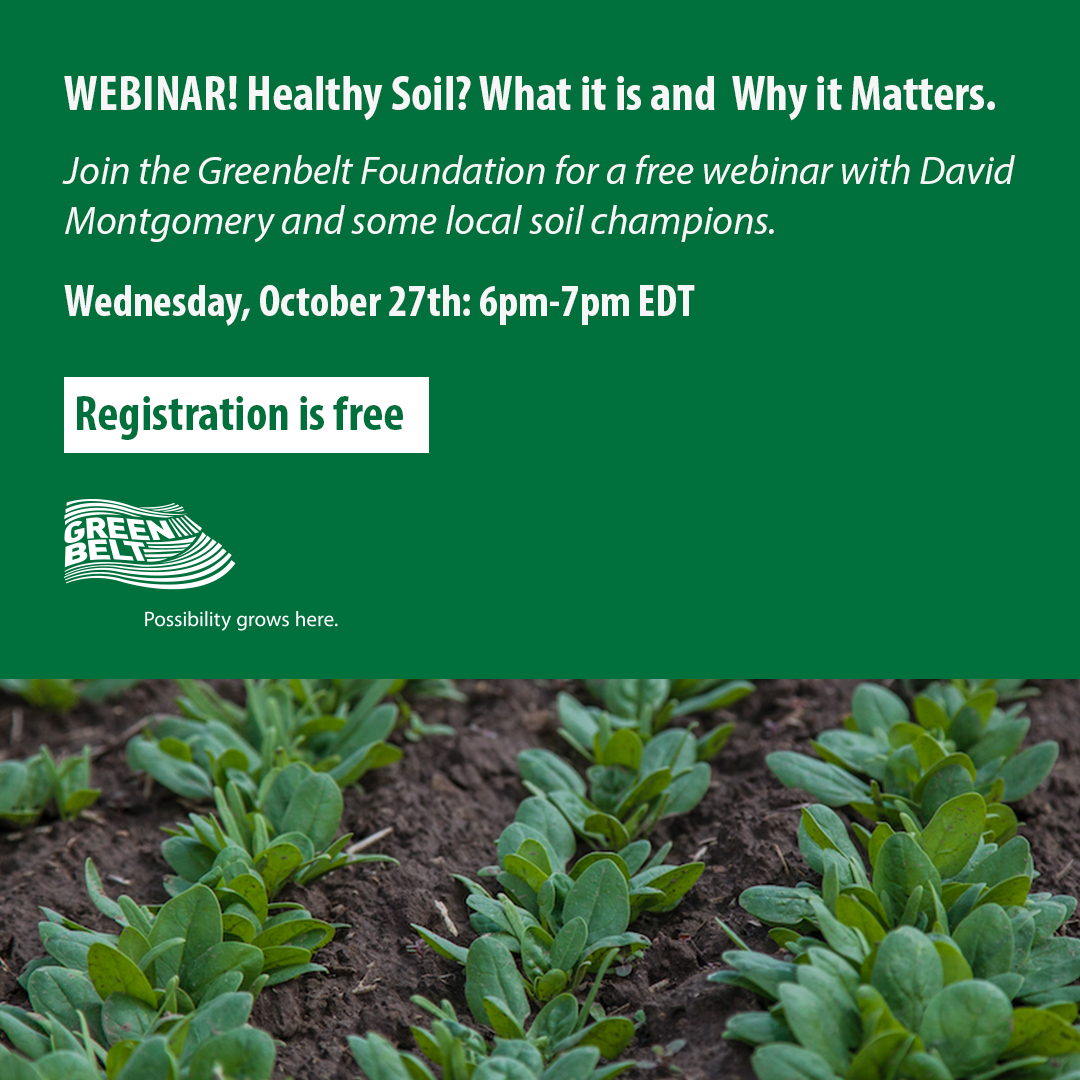Healthy Soil? What it is and Why it Matters.
A free webinar with David Montgomery and some local soil champions
Wednesday, October 27th | 6 – 7 p.m. EDT
 Agricultural soils in the Greenbelt and the Greater Golden Horseshoe are among the best in Canada, supporting prosperous farms and local food systems. But climate change and declining soil health can threaten that prosperity. As climate change increases the frequency and intensity of extreme weather events, farmers are facing unprecedented challenges. However, farmers are adapting by leveraging the bedrock of their business: the soil. Research has shown that management practices that are good for soil health are good for the planet. They strengthen food security, build productivity and profitability for farmers, enhance biodiversity and help mitigate climate change.
Agricultural soils in the Greenbelt and the Greater Golden Horseshoe are among the best in Canada, supporting prosperous farms and local food systems. But climate change and declining soil health can threaten that prosperity. As climate change increases the frequency and intensity of extreme weather events, farmers are facing unprecedented challenges. However, farmers are adapting by leveraging the bedrock of their business: the soil. Research has shown that management practices that are good for soil health are good for the planet. They strengthen food security, build productivity and profitability for farmers, enhance biodiversity and help mitigate climate change.
Building the health of soil ecosystems to sustain productivity and build resilience to climate change is a new focus for agriculture. But what is soil health and why does it matter?
Join the Greenbelt Foundation on Wednesday, October 27th at 6 p.m. for a free 1-hour webinar on soil health. Special guest speaker David Montgomery, Professor of Earth and Space Sciences at the University of Washington and author of Growing a Revolution: Bringing Our Soil Back to Life, will provide an introduction to soil health and outline its value for people, the planet, and farm profits. Hear from an innovative farmer adopting sustainable farming practices and learn how soil management practices are critical for the health of our local watersheds. The webinar will introduce you to the soil health movement at both the local and global scale, and provide you with an opportunity to get your questions answered.
Guest Speakers:
David Montgomery is a MacArthur Fellow and professor of geomorphology at the University of Washington. He studies landscape evolution and the effects of geological processes on ecological systems and human societies. An author of award-winning popular-science books, he has been featured in documentary films, network and cable news, and on a wide variety of TV and radio programs. His books have been translated into nine languages. He lives in Seattle with his wife, and co-author, Anne Biklé.
Mark Eastman has worked in Agricultural Outreach at Credit Valley Conservation for the past 12 years, after working as a consultant in the agricultural municipal drainage sector. Mark has degrees from the University of Guelph and McGill University in Earth and Atmospheric Science and Agricultural Engineering. Combining his technical knowledge with his agricultural experience, having been raised on a pig farm in Lambton County, he has built close relationships with the farmers of the Credit River Watershed and has assisted with implementation of numerous agri-environmental projects aimed at protecting soil health, water and air quality, and wildlife habitat. In his spare time, Mark and his wife operate a small farm in Halton Region where they grow cut flowers, garlic and hay.
Mel Luymes is a freelance sociologist, project manager and writer. Her family runs a grain farm and custom farming business near Moorefield, ON, using precision cover crops, no-till and strip-till on their own fields. Co-founder of the Ontario Soil Network, she loves to work at the intersection of agriculture, behaviour change and the environment.
Joanne Feddes is the third generation to run La Primavera Farms, near Dundas, ON. Starting in 1954 as a dairy farm, La Primavera Farms now produces poultry, corn, soybeans, wheat and cut flowers, with a small herd of highland cattle. Joanne is a member of the Ontario Soil Network, and uses cover crops, manure and reduced tillage to build soil health on the farm.

